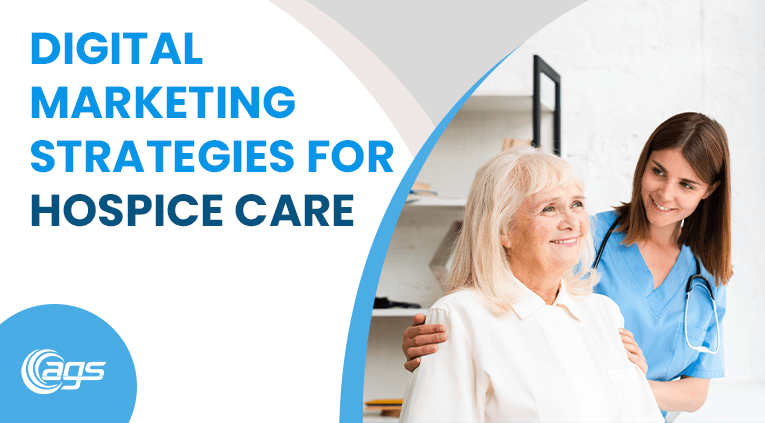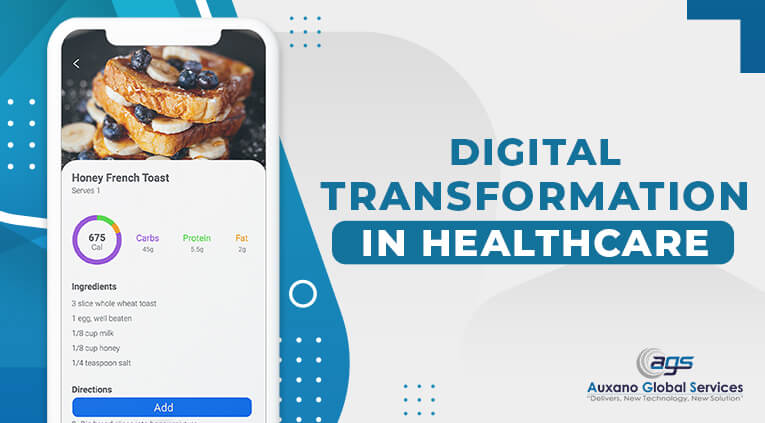The healthcare industry is undergoing a disruptive transformation with the introduction of big data. While healthcare has traditionally been very data-driven, the volume and complexity of available data are increasing exponentially. Big data transforms how healthcare organizations interact with, collect, and analyze data.
AI and machine learning are increasingly important in the healthcare industry. From image recognition to natural language processing, these technologies allow healthcare organizations to extract meaningful insights and make real-time data-driven decisions.
This article will cover how big data can be used to improve patient care, streamline processes, and increase efficiency. But before, let’s look at some healthcare statistics to have a better understanding of this industry:
Healthcare Industry Statistics
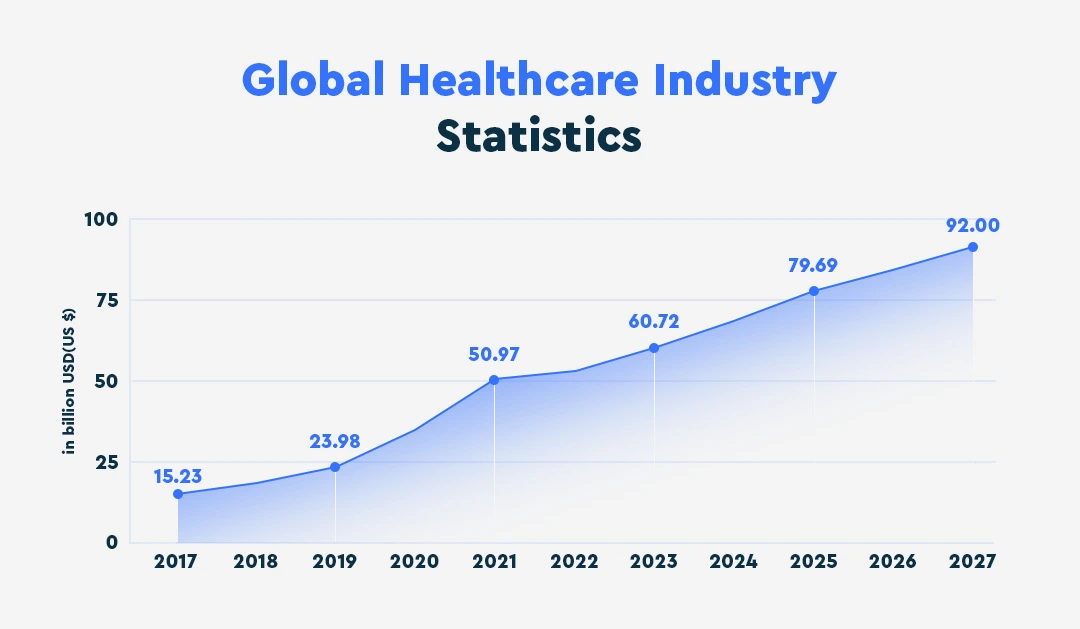
According to Statista reports, the global healthcare industry is expected to grow at a CAGR of 10.95% between 2024 and 2027. Moreover, this industry in the US alone is all set to touch the mark of $92.01 billion by the end of 2027.
In 2018, the healthcare industry was hovering around $8,452 billion, and by the end of 2025, it will touch the mark of $11.9 trillion.
By the end of 2029, the healthcare industry will add more than 2 million jobs with a progressive growth rate of around 15%.
Looking at the statistics, it’s clear that big data and AI are becoming essential for healthcare organizations to stay competitive. On this note, let’s look at the role of big data in the healthcare domain.
What Exactly Is Big Data In Healthcare?
Big data in healthcare refers to the process of collecting, storing, and analyzing a massive amount of structured and unstructured data. This data is used to identify patterns and healthcare trends that can be harnessed to improve patient care and outcomes. Big data analytics tools are used by clinicians and medical researchers to gain valuable insights into the health of patients.
The scope of big data analytics in healthcare is vast. It can be used to monitor and predict patient outcomes, reduce healthcare costs, improve operational efficiency, and more. For example, predictive analytics can be used to predict epidemics and identify patterns in patient behavior.
Big data can also be used to create personalized treatments based on a patient’s genetic makeup and medical history. Let’s explore the role of big data in this industry and how it can improve patient care.
Why Is Collecting Relevant Data In Healthcare Necessary?
By collecting accurate and timely data, healthcare organizations can better understand their patient’s needs and develop strategies to meet those needs effectively. For example, hospitals can use big data analytics tools to monitor the performance of medical equipment and identify any potential problems before they become critical.
In addition, from the perspective of precision medicine, data is used to personalize treatments for each patient. This means that physicians can better target interventions and develop tailored treatment plans that are more effective for the patient.
Big data is also enabling healthcare providers to improve care coordination by collecting data from multiple sources and providing a more comprehensive view of the patient’s health. This allows providers to manage patient care better and coordinate services with other healthcare organizations. On this note, let’s look at the types of healthcare data that can be collected and analyzed.
Types Of Healthcare Data
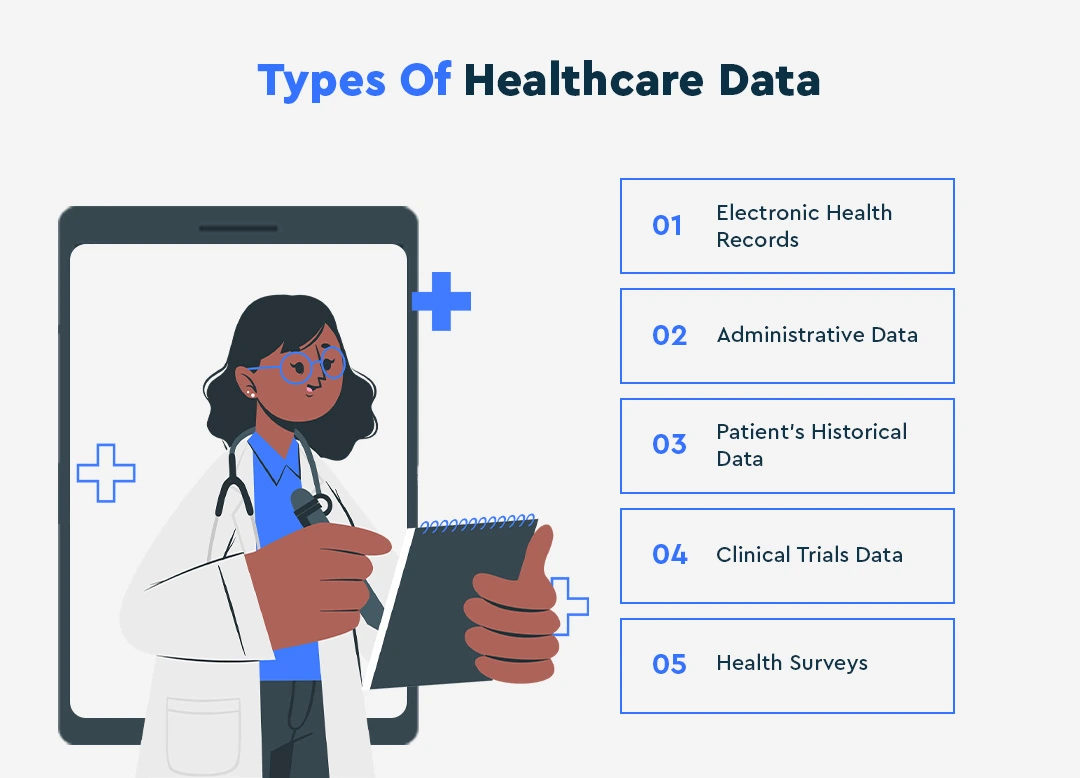
1. Electronic Health Records
EHRs are digital versions of paper charts in clinician offices, hospitals, and other healthcare facilities. They contain patient medical history, diagnoses, treatments, medications, and laboratory test results. EHRs can be used to improve communication between providers, share data more easily with patients, and reduce administrative costs.
Electronic health records help providers to track and manage a patient’s care more effectively. This helps them make better-informed decisions based on the data collected in the records, such as which medications may be most effective for a given condition.
EHRs also provide helpful information such as lab results, imaging studies, and other diagnostic tests to help providers offer more accurate diagnosis data.
2. Administrative Data
Administrative data are collected from healthcare institutions for administrative and financial purposes. This includes billing information, patient demographics, appointment information, and insurance claims. This type of data helps track trends in healthcare costs, resource utilization, and the effectiveness of treatment strategies.
It can also help identify areas where improvements can be made in healthcare systems and services. With accurate administrative data, providers can better understand where services are being utilized and whether they are meeting patient needs efficiently.
3. Patient’s Historical Data
Patients’ historical data includes medical records, lab results, and imaging studies. These can help providers make more informed decisions about a patient’s care. The data can also be used to detect patterns in disease progression and determine the best treatment options.
By analyzing patients’ historical data, healthcare organizations can identify trends in diseases and conditions, which can help inform better care plans and reduce healthcare costs. Moreover, it becomes handy for providers to track a patient’s progress over time and monitor their treatment. With accurate and up-to-date information, providers can develop more effective treatments and provide better care.
4. Clinical Trials Data
The next type of big data in healthcare is clinical trial data. Clinical trials are performed to check and understand the overall safety, efficacy, and effectiveness of medical treatments. Data collected from these studies can be used to inform healthcare decisions and improve patient outcomes.
Clinical trials also provide valuable information about drug safety, side effects, dosage forms, and other essential factors that should be considered when prescribing medications. By analyzing clinical trial data, organizations can better understand how treatments are working in real-world scenarios and identify areas where improvement is needed.
5. Health Surveys
Health surveys are another type of healthcare data that is used to gain insights into patient health and well-being. These surveys typically include questions about lifestyle habits, medical history, symptoms, treatments, and other related topics.
The data gathered from these surveys can be used to identify risk factors for certain health conditions and develop targeted interventions to address them. It can also help healthcare providers tailor treatments to individual patients more effectively and improve overall patient outcomes.
Moreover, health surveys can provide valuable insights into the impact of chronic conditions, such as diabetes or mental health disorders, on patients’ lives. Now, let’s explore how access to big data technology improves patient care.
How Does Big Data Improve Patient Care?
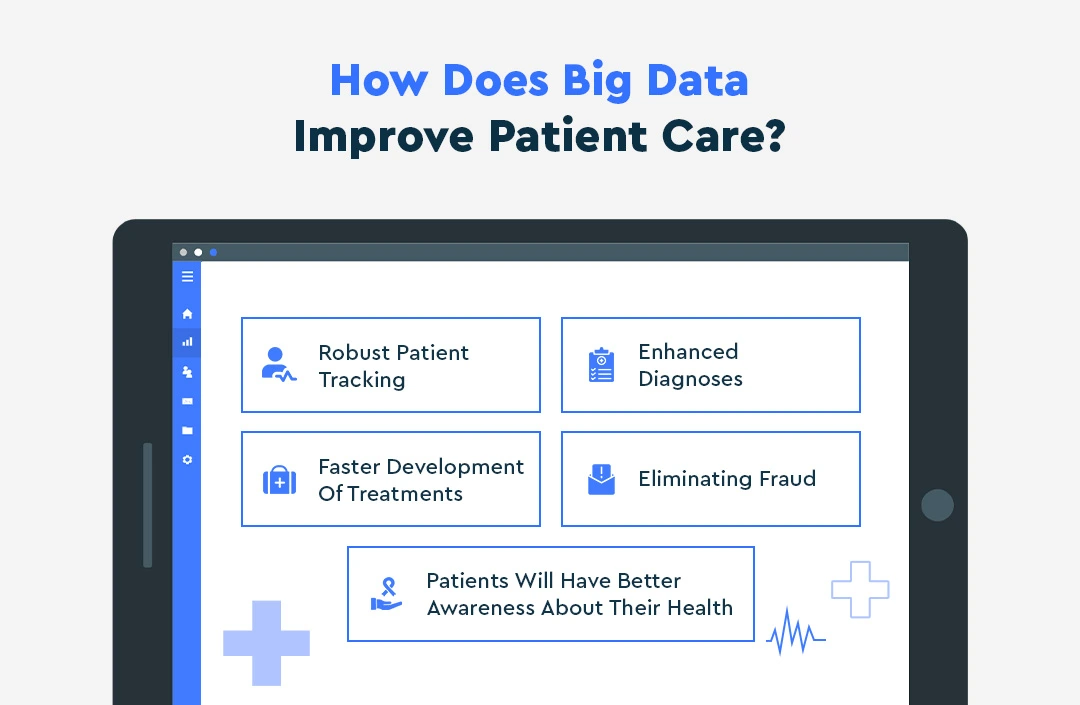
1. Robust Patient Tracking
Patient tracking refers to the process of monitoring the health and well-being of a patient over time. Big data enables healthcare providers to store and analyze vast amounts of patient data, making it easier for them to track changes in individual patient’s conditions.
By tracking changes in health indicators such as blood pressure, temperature, heart rate, and other biomarkers, big data can help healthcare providers detect subtle changes in a patient’s health that may indicate an underlying medical condition.
Furthermore, big data can also track changes in lifestyle choices such as diet, exercise, and medication regimes. This type of data can provide valuable insights into a patient’s overall health and can help healthcare providers tailor treatment plans better.
2. Enhanced Diagnoses
Big data is a boon to improve diagnoses and treatments. By leveraging the power of machine learning algorithms, healthcare providers can analyze patient data in order to identify patterns that may be indicative of a particular illness or condition.
This type of analysis has the potential to greatly assist healthcare providers in making more informed decisions regarding diagnoses and treatments, ultimately leading to better patient outcomes.
In addition, big data can also help healthcare providers to analyze large datasets in order to identify risk factors associated with particular illnesses or conditions. This information can be used to create more tailored preventative care plans that are better suited to addressing the needs of individual patients.
3. Faster Development Of Treatments
Big data can also be used to improve treatments and the development of new treatments. By analyzing patient data, healthcare providers can identify trends in how certain diseases or conditions respond to different treatment methods. This type of analysis has the potential to speed up the development process for new treatments and drugs.
Furthermore, big data will continue to become more important as genetic sequencing technology progresses. By analyzing patients’ genomic data with certain illnesses or conditions, healthcare providers can gain insight into how best to treat those illnesses and develop new treatments.
4. Eliminating Fraud
When operations are executed on multiple levels, there are higher chances of fraud. However, leveraging big data can help identify and eliminate fraud. Big data helps to detect any suspicious activities quickly and implements preventive measures that are efficient in eliminating fraud. Thus, it helps to make the process smoother and save money in the long run.
With the integration of blockchain with big data, healthcare providers can ensure secure financial transactions, which ultimately helps eliminate any fraudulent activities. Even when the operations are scaling, big data helps to detect any suspicious activities quickly and take preventive measures.
5. Patients Will Have Better Awareness About Their Health
With big data analytics in healthcare, patients will have access to more personalized healthcare services. They can receive reminders to take their medications, get alerts when they are at risk of a certain disease or condition, and track vital health indicators such as temperature and heart rate.
This type of data can empower patients by giving them insight into their own health and helping them to make informed choices about their treatment plans. After exploring the benefits of big data for patients, let’s check out how hospitals can improve their overall functioning.
How Does Big Data Improve Hospital Operations?
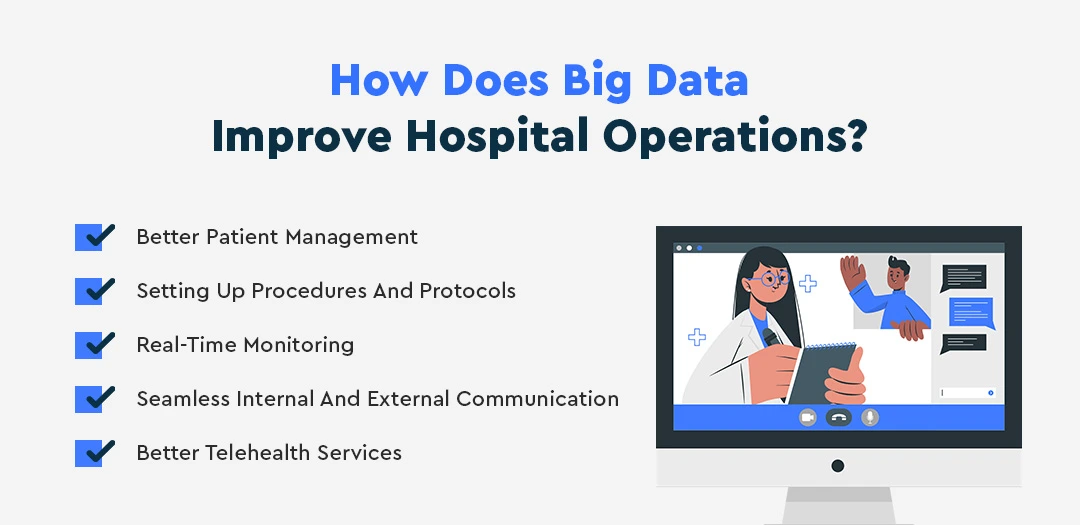
1. Better Patient Management
Big data impacting healthcare management can include better patient management. This includes more effective diagnosis and treatment of illnesses, improved patient safety, reduced healthcare costs, and enhanced communication between doctors, nurses, and patients. With big data analysis, hospitals can identify high-risk patients who may require closer monitoring or additional resources to receive the best care possible.
The chances of medical errors are possible to reduce with big data analytics. As more information is gathered and analyzed, hospitals can improve their decision-making processes, ensure the accuracy of medications and treatments, and reduce preventable errors. Big data can also help to identify patterns in medical history that can lead to more accurate diagnoses.
2. Setting Up Procedures And Protocols
Big data can help hospitals design and improve the procedures and protocols related to patient care. Medical professionals can use data to identify risks more quickly, reduce medical errors, improve treatment outcomes, and set up protocols that are tailored for each individual patient.
With access to a large amount of data, doctors can also make smarter decisions faster, increasing the efficiency of medical operations. By analyzing data from years of experience, hospitals can develop better protocols for patient care and create more accurate guidelines for care. Moreover, doctors can go through data, procedures, and other vital data from their healthcare app.
3. Real-Time Monitoring
Big data analytics can also help hospitals with real-time monitoring. By collecting patient information in real-time, medical professionals can make sure that patients receive the right treatment at the right time and reduce the risk of medical errors. Real-time monitoring also allows for faster diagnosis so that treatments and medications can be administered quickly to minimize the risk of worsening conditions.
Additionally, real-time monitoring can help to identify potential outbreaks and take the necessary steps to contain them before they spread. The best part is that all this data is available over mobile applications that are available to doctors, nurses, and patients
4. Seamless Internal And External Communication
Big data will help hospitals improve internal and external communication. By leveraging big data analytics, healthcare providers can create a more efficient communication network to share patient status updates, schedule appointments, and coordinate resources.
Healthcare professionals can also use predictive analytics to analyze the current trends in medical care and make decisions about resource allocation. Moreover, with better communication, healthcare workers can ensure that the right information is shared between stakeholders in a timely manner.
5. Better Telehealth Services
Big data can also help hospitals provide better telehealth services. With the help of predictive analytics, healthcare providers can develop more efficient ways to deliver care and reduce costs related to in-person visits.
By using remote monitoring technologies, healthcare professionals can keep track of patients’ health without having them visit a physical location. This not only saves time and resources for the hospital but also reduces the amount of stress put on patients.
After knowing all the benefits of leveraging big data, let’s look at the cost of developing a healthcare app.
How Much Does It Cost To Build A Custom Healthcare App?
After looking at all the factors involved in developing a healthcare app, it’s essential to know how much the whole project will cost. The answer to this question depends on many factors, such as the complexity of the app, its features and functions, design, the platform you choose (iOS or Android), and how much time it takes to develop.
In general, a healthcare app can range between $50,000 to $100,000, and for complex features, it can go up to $300,000 and more. On this note, let’s look at some key factors that influence the cost of healthcare app development.
Crucial Factors Influencing The Cost Of Healthcare App Development
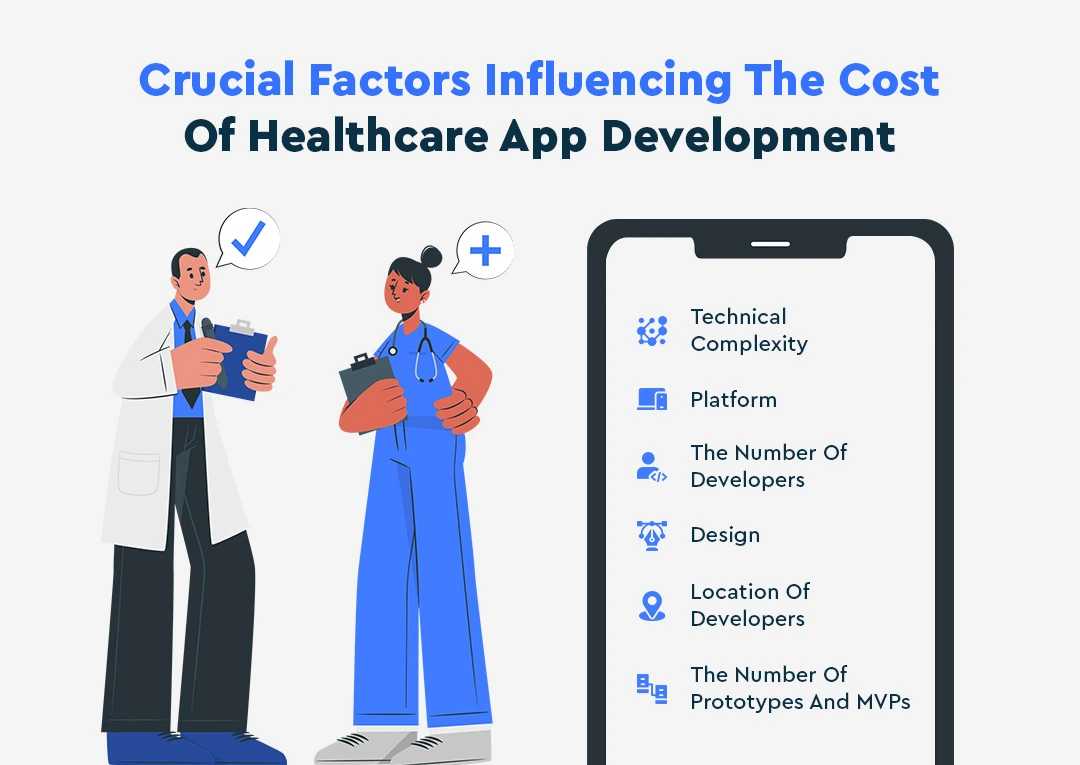
There are several factors that affect the cost of healthcare app development. Below are some of the important ones influencing factors for a healthcare app:
1. Technical Complexity
Depending on the features and functions that you want to include, the cost of development may vary. For example, if you are building a healthcare app for patient management with features like data collection and analysis, the cost will likely be higher than an app only for medical consultation. Moreover, the number of features and functions of the app affects the cost too. If you require more features, it can take more resources to develop so it will be more expensive.
2. Platform
The cost of app development may also vary depending on the platform you choose. Developing an app for both Android and iOS can be more expensive than if you decide to focus on one platform. On the other hand, developing your app on hybrid platforms such as React Native, Ionic, or Flutter can reduce the cost because you don’t need to code for both Android and iOS.
3. The Number Of Developers
The number of developers needed to create the app will also affect the cost, and the more developers you have, the higher the cost will be. You may need more developers if your app requires complex features or a longer development time. Thus, it’s first important to figure out how many developers you need before you start the development process.
4. Design
The design of your app is an essential factor in determining its cost as well. A good design can make your app stand out from the competition and create user engagement. It will also take more time to develop a professional-looking design, and thus, it will be more expensive. Furthermore, the cost of design may vary depending on the platform you choose, as the design for iOS and Android are different.
5. Location Of Developers
The cost of development may also vary depending on the location of the developers. For instance, if you are hiring developers from countries with lower wages, it can reduce the cost. On the other hand, if you’re hiring developers from countries where wages are higher, it will be more expensive.
6. The Number Of Prototypes And MVPs
The number of prototypes and minimum viable products (MVPs) you want to create for testing will also affect the cost. Creating more MVPs can take up more resources, making it more expensive. However, it’s crucial to test the product with MVP so that you can make sure it’s user-friendly and functional before launch.
Thus, it’s essential to hire an experienced company like AGS to develop your healthcare app. With a professional app development partner, you can get accurate estimates of the cost and time required to develop your app.
Why Hire Auxano Global Services For App Development?
AGS is a professional healthcare app development company that can provide you with the best possible app development service. We have a team of experienced healthcare developers who are well-versed in developing custom apps for healthcare, patient management, medical consultation, and more.

Moreover, we use the latest tools and technologies to ensure your app is up-to-date and user-friendly. With us, you can also get the best estimates of the cost and time required to develop your app, as we have a process-oriented approach that enables us to calculate the cost and time for development accurately.
Wrapping Up!
In conclusion, Big Data will revolutionize the healthcare industry and improve patient care. With a well-developed healthcare app, it is possible to collect and analyze data for improving medical care.
In addition, It’s the right time to invest in healthcare app development, as it can open up new opportunities for your business. But before you start the project, hire an experienced company like AGS for healthcare app development, as we will provide you with the best possible service.
Frequently Asked Questions
-
1. How Will Big Data Change Healthcare?
Big data will help to revolutionize healthcare by enabling medical professionals to collect and analyze patient data more efficiently. This data can then be used to provide better and more personalized care to patients and improve the accuracy of diagnoses and treatments.
-
2. How Much Does It Take To Create A Healthcare App?
The cost of developing a healthcare app will depend on many factors, such as the type and complexity of the features, the number of developers required, the design, and more.
-
3. Why Is Big Data Important In Healthcare?
Big data is essential in healthcare, as it helps to provide a more accurate diagnosis and treatment plan for each patient. It also helps medical professionals to analyze large amounts of data quickly, allowing them to make faster and more accurate decisions.
-
4. How Much Time Does It Take To Develop A Healthcare App?
The time required to develop a healthcare app will depend on the complexity of the features, as well as the number of developers and other factors. Generally, it takes around 4-5 months to develop a healthcare app.
-
5. What Are Some Of The Benefits Of A Healthcare App?
A healthcare app can provide many benefits, such as improved patient engagement, better data analysis and insights, easier appointment management, and more.



